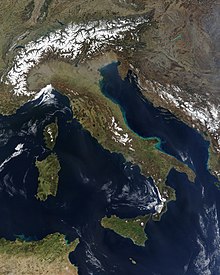This is an old revision of this page, as edited by Ahecht (talk | contribs) at 14:17, 25 October 2024 (Ahecht moved page Italian Peninsula to Italian peninsula without leaving a redirect: Requested by Cinderella157 at WP:RM/TR: Not consistently capped in sources - per WP:NCCAPS and MOS:CAPS.). The present address (URL) is a permanent link to this revision, which may differ significantly from the current revision.
Revision as of 14:17, 25 October 2024 by Ahecht (talk | contribs) (Ahecht moved page Italian Peninsula to Italian peninsula without leaving a redirect: Requested by Cinderella157 at WP:RM/TR: Not consistently capped in sources - per WP:NCCAPS and MOS:CAPS.)(diff) ← Previous revision | Latest revision (diff) | Newer revision → (diff) Peninsula in South-central Europe "Lo Stivale" redirects here. For the Canadian newspaper, see Lo Stivale (newspaper). For the broader geographical region in Southern Europe, see Italy (geographical region).42°00′N 14°00′E / 42.000°N 14.000°E / 42.000; 14.000

The Italian Peninsula (Italian: penisola italica or penisola italiana), also known as the Italic Peninsula, Apennine Peninsula, Italian Boot, or Mainland Italy, is a peninsula, within the Italian geographical region, extending from the southern Alps in the north to the central Mediterranean Sea in the south which comprises much of the country of Italy and the enclaved microstates of San Marino and Vatican City.
Overview
It is nicknamed lo Stivale (the Boot), due to the shape of the peninsula resembling a high-heeled boot. Three smaller peninsulas contribute to this characteristic shape, namely Calabria (the "toe"), Salento (the "heel") and Gargano (the "spur"). The backbone of the Italian Peninsula consists of the Apennine Mountains, from which it takes one of its names. The peninsula comprises much of Italy and also includes the enclaved microstates of San Marino and Vatican City.
Physical geography

Geographically, the minimum extent of the Italian Peninsula consists of the land south of a line extending from the Magra to the Rubicon rivers, north of the Tuscan–Emilian Apennines. It excludes the Po Valley and the southern slopes of the Alps. The Italian Peninsula has the only active volcano on continental Europe, Mount Vesuvius.
Political geography
In general discourse, "Italy" and the "Italian Peninsula" are often used as synonymous terms. However, Northern Italy may be excluded from the Italian Peninsula. From a political point of view, the Italian Peninsula in the strict sense (therefore excluding Insular Italy and Northern Italy) is divided into various states listed in the following table:
| Country | Population | Peninsular area | Description | ||
|---|---|---|---|---|---|
| km | sq mi | Share | |||
| 26,140,000 | 131,275 | 50,686 | 99.9531% | Virtually the entire peninsula | |
| 31,887 | 61.2 | 23.6 | 0.0466% | A central-eastern enclave of peninsular Italy | |
| 829 | 0.49 | 0.19 | 0.0003% | An enclave of Rome, Italy | |
See also
References
- "The BOOT of ITALY". June 2023. Retrieved 5 October 2023.
- De Agostini Ed., L'Enciclopedia Geografica – Vol. I - Italia, 2004, p. 78.
- Touring Club Italiano, Conosci l'Italia – Vol. I: L'Italia fisica, 1957.
- "Mount Vesuvius, Italy: Map, Facts, Eruption Pictures, Pompeii".
- Vocabolario Treccani, Peninsulare
- De Agostini Ed., L'Enciclopedia Geografica - Vol. I - Italia, 2004, p.78
- Touring Club Italiano, Conosci l'Italia - Vol. I: L'Italia fisica, 1957
- Population includes only the inhabitants of the Italian Peninsula, excluding Northern Italy and Insular Italy (Sardinia and Sicily).
External links
 Media related to Italian Peninsula at Wikimedia Commons
Media related to Italian Peninsula at Wikimedia Commons
| Earth's primary regions and subregions | |||||||||||||||
|---|---|---|---|---|---|---|---|---|---|---|---|---|---|---|---|
| Worlds | |||||||||||||||
| Hemispheres | |||||||||||||||
| Landmasses | |||||||||||||||
| Continents |
| ||||||||||||||
| Islands |
| ||||||||||||||
| Oceans | |||||||||||||||
| Other waterbodies | |||||||||||||||
| Rim | |||||||||||||||
| Polar | |||||||||||||||
| Global | |||||||||||||||